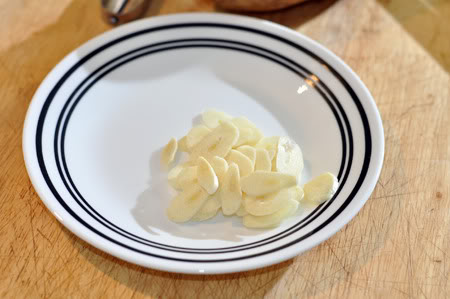Step one: repair coffee mill ↓.
That ↑ was actually a few days ago so the epoxy had plenty of time to dry. But it was still unproven. There was a little spring action to the post that holds the blade so I weighted down the blade with a tin of tomatoes. I might have glued it shut. I might have glued it too high on its post so that it doesn't work properly.
Step two: prepare a topping for Hasselhoff potato, although a topping is not necessary.
Hurray, the coffee mill works.
A local grocery store set up an elaborate cheese aisle. The two girls I spoke with yesterday equated Parmigiano Reggiano with their house brand, one saying, "The only difference is that "Reggiano" specifies a place."
I asked the girl, "Have you ever tried this?"
"No, I haven't."
I bought their last package and they hadn't yet brought out another wheel, a situation I find inexplicable. "I urge you to sample. A comparison test will change your view permanently."
The topping is breadcrumbs, rolled oats, Parmigiano cheese, butter.
Thin garlic slices to be inserted between potato slices.
Online sources suggest the use of chopsticks for the knife-brakes. But chopsticks taper so I used wooden spoon handles instead. I did learn something right off. The tip of the potato curves up so its edge is unaffected by the spoon-handle brakes. I nicked off the tip of my potato on the first cut. I put it back with a toothpick, okay for my photography, but unacceptable for service.
These potato slices are on the thin side. A slice of garlic, even a very thin slice, is too much much garlic for one potato. Maybe. So I put one thin slice of garlic between every other slice of potato.
I did not peel the bottom of the potato because I wanted it to be like a boat. Maybe I should have left more on.
I noticed a wonderfully creative post on blog, michaelangelointhekitchen.blogspot.com, titled Hasselbug Potato, here.
Arthur uses a carving tool to make long scores along the length of an unpeeled potato, then crosses them with ordinary Hasselhoff slices. He saves the scoring scraps, presumably in water to prevent oxidization, then inserts the scraps into the gaps extending outward as legs of a bug. the combination of squiggly scrappy legs with a crosshatch pattern on the back really does resemble a bug.
Conclusion: Like any baked potato this could benefit from some kind of sauce. Even a flavored sour cream will do.
I decided I like the topping a lot, although it does not add moisture. A nest of that baked separately would work. A lacy Parmesan tulle, perhaps baked directly onto the plate, maybe a nest or as bug legs, but all that still leaves the need for moisture. Maybe a nod to its escalloped potato origin might be the best answer, set the topped potato upon a pool of cheesy cream sauce. Using Arthur's idea, I can imagine a sort of water bug.
















1 comment:
Kayotic Kitchen suggests putting the potato in the bowl of a spoon and using the edges of the spoon as a knife bread. If you picked the right depth of a spoon that should work well.
Post a Comment